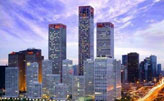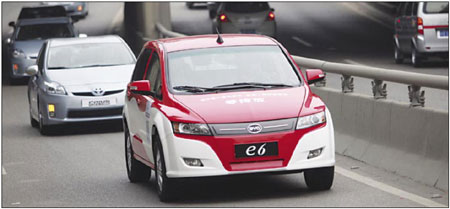Business
Slow start for BYD electric car sales
Updated: 2011-05-19 11:02
By Wang Chao (China Daily)
|
BYD has provided 50 e6 electric cars to taxi operators in Shenzhen, Guangdong province, as part of a trial run. A hui / for China Daily |
BEIJING - BYD's worst nightmare came true last year.
BYD, which stands for Build Your Dream, is known as the pioneer of electric vehicles in China. The company had high expectations for the F3DM and had hoped to sell up to 1,000 units.
Even combined with an incentive backed by the central government, the company sold fewer than 500 electric cars in 2010. The F3DM can switch between hybrid electric and electric modes, and can be charged at home using a 220v outlet.
The sales numbers are certainly far from impressive, especially when compared to its counterparts. Chevy Volt and Nissan Leaf, the two mass-produced electric cars in the world, sold 493 units and 573 units, respectively, in North America in April alone.
BYD started as a cell phone battery manufacturer in 1995 and became the second-largest supplier in the world in 2003. In the same year, BYD acquired a domestic auto company, and edged into the top three homegrown auto brands in China in five years.
BYD said it is a company with multiple businesses: IT, conventional cars and electric cars. The company proudly claims that one out of every three cell phone batteries in the world is made by BYD.
But in 2008, it broke into the electronic vehicle field. That year, when the world just began to feel the chill of the financial crisis, Warren Buffett invested $230 million (158 million euros) to buy 10 percent of the company's shares, making it an overnight superstar. Since then, the company's development of electric vehicles has attracted auto experts' attention from all over the world.
BYD argues that the small sales numbers are a result of a limited production capacity. The company produced only 50 units of the e6, and sent all of them to a taxi company in Shenzhen for pilot operation. This model is not yet available to consumers. The production capacity of F3DM, which is priced at 168,000 yuan ($25,838), is only 400 a year.
The price may be another reason why consumers aren't charged up to purchase the F3DM model. BYD's most popular conventional models are priced between 50,000 yuan and 100,000 yuan.
Song Jian, executive vice-president of Tsinghua Automotive Engineering Institute, said BYD's struggle is a reflection of the whole electric vehicle industry in China. Although automakers are enthusiastic in pushing forward with electric vehicles, the lack of infrastructure and the public's confidence in safety and performance hold consumers back.
"Without a real market, automakers dare not bet all their resources on (electric vehicle) development, which further restricts the quality improvement. This just forms a vicious circle in the industry," Song said.
"If an electric car is expensive, not reliable and not safe, who is going to buy it?"
The central government picked six cities - Shanghai, Hangzhou, Shenzhen, Hefei, Changchun and Beijing - as pilot cities to promote electric cars. These cities are aggressively laying out the necessary infrastructure, including charging stations.
Shenzhen in South China's Guangdong province, where BYD's headquarters is located, four charging stations were built and 180 charging pillars were installed by the end of November 2010. But this wasn't the tipping point for many consumers.
BYD is proud of the progress it has made in the development of electric vehicles. Xia Zhibing, general manager of BYD, said he is very glad to see that the battery in the car is strong enough to stand the pilot program in Shenzhen.
"BYD is the first in the world to launch a big-scale electric car pilot operation. And, on average, a car runs 90,000 km, the equivalent of a (gas-powered) car running for 6 years," Xia said, adding that BYD will make some adjustments at the pilot program based on drivers' comments.
BYD has also formed a joint venture company with Mercedes-Benz to develop electric cars. The new company has finished the design of its first electric car and is ready to test it.
"I believe it is win-win cooperation, since both sides have their strengths: BYD has battery technology, and Mercedes-Benz certainly has all-around knowledge on cars," Xia said.
BYD has already adopted the lithium-ion battery technology that originated from the US, which is "the most promising battery technology for electric vehicles", as Song said.
"The battery is the most essential component of an electric vehicle. But the battery efficiency of BYD is at least 20 percent lower than that in developed countries," he added.
Wang Jianjun, vice-general manager of BYD, said the company will stick to this battery technology, since it is the easiest way to commercialize electric vehicles.
"We will develop technologies in two niche markets: One for private customers in selected cities, one for public transportation. We will gradually roll out the pilot operation of city buses in major cities," he said.
Despite the cool reception from the market, Wang Chuanfu, chairman and president of BYD, said development of the electric car is necessary in order to catch up with the foreign auto giants.
"Honestly speaking, Chinese cars are not able to compete in the conventional car area, if only by lower price. We have to develop (electric vehicles)."
Although labeled as the electric car pioneer, BYD's current revenue relies heavily on conventional cars. Li Yunfei, assistant general manager of BYD Co Ltd, admits that most of the BYD electric vehicles are still being tested.
From 2005 to 2010, sales of BYD conventional cars kept a year-on-year growth rate of more than 100 percent, once considered as the "BYD miracle" in the auto industry.
Among its models, BYD F3 is the top seller of Chinese small car models. It is known for its fashionable design and low price, which starts at 56,000 yuan.
The glory comes with criticism and suspicion, though.
For years BYD has been criticized for its copyright infringement, on its car design and its battery technology. A joke well-known among Chinese drivers is that if you replace the logo of a BYD F3 with one from a Toyota Corolla, "nobody can tell them apart from a distance".
At the same time, BYD is facing a problem every Chinese car brand is worried about. By winning the market with a low price in the beginning, it found its cars were stereotyped - cheap and of poor quality. To change its image, BYD introduced S6, the first mid- to high-end SUV, at last month's Shanghai auto show.
The company was also affected by its dealership policy adjustment. Its revenue in 2010 plummeted by 34 percent to 2.52 billion yuan, down from 3.79 billion yuan in 2009. BYD adjusted its sales goal from the original 800,000 units to 600,000 units, but sold only 520,000.
Since 2008, the company has been trying to push its product in the US market. It finally made progress when the Los Angeles authorities agreed to test the e6 last year.
It originally planned to introduce e6 to the US at the end of last year, but later postponed entry to the US mass market till the first quarter of 2012.
China Daily
(China Daily 05/19/2011 page15)
Specials

The song dynasty
There are MORE THAN 300 types of Chinese operas but two POPULAR varieties are major standouts

Sino-US Dialogue
China and the US hold the third round of the Strategic and Economic Dialogue from May 9-10 in Washington.

Building communities
American architect John Portman and his company have developed more than 30 projects across China.
